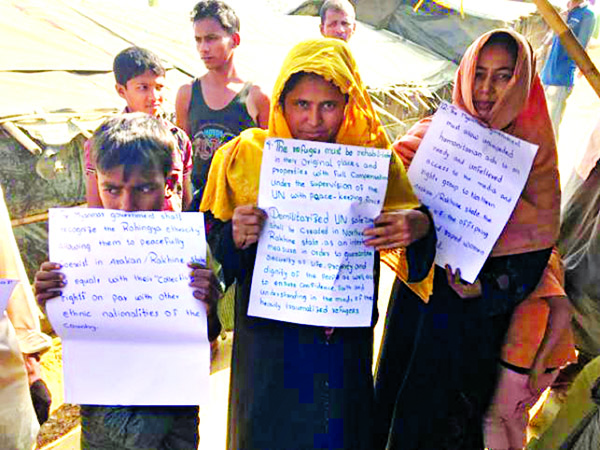
Staff Reporter :
Rohingyas, who have taken refuge in Bangladesh, are organising themselves against force repatriation before their recognition as Myanamar nationals, sources close to the refugee camps said.
Bangladesh and Myanmar have already signed a deal to begin the repatriation of Rohingyas, who erected their temporary shelters on an area of over 5,000 acres of land on the hillocks along the Cox’s Bazar-Teknaf highway.
They are organizing themselves and start voicing concern over whether they are to be repatriated forcefully even before their longstanding demand for recognition as Myanmar national is met, sources said.
Rumours also ran rife that they will be repatriated forcibly, spreading a wave of panic through the refugee camps.
“One evening, a rumour spread that the military will come that night and will pick us up for repatriation,” a Rohingya youth, Mohmmad Alal, told local journalists at Kutupalong Rohingya camp, where he has taken shelter along with his parents and other family members.
He said the Rohingyas, youths in particular, guarded the camp throughout that night in phases.
“We are still vigilant about the developments. We are also trying to get news about what the authorities of Bangladesh and Myanmar are doing about our repatriation. We, of course, want to go back to our motherland but before that the Myanmar authorities must recognize us as Myanmar nationals,” he added.
Sensing the presence of this correspondent, a group of inhabitants-both male and female-of Balukhali camp came forward in a line recently, carrying placards with their demands regarding repatriation.
The very ‘well-drafted’ nine-point demand includes ensuring UN security arrangements over there in Myanmar before their repatriation, ensuring their recognition as Myanmar nationals, ensuring involvement of UN, OIC, HRW and other international bodies in the process, ensuring free access of media personalities to the areas and trial of perpetrators of genocide and mass killing in the international court.
Talking with local journalists, another Rohingya youth, Jabbar Hossain, who was apparently leading the group, said the Rohingyas will not start their journey back if they were kept in any transit camps in Myanmar and if they were not sent back straight to their ancestral village homes.
Jabbar, who arrived in Bangladesh during the earlier influxes and is currently studying in a private university in Bangladesh, said he looks after the wellbeing of Rohingyas.
He said they were organising young and somewhat educated Rohigiya people in all the camps about their demands.
“We sometimes visit different camps and apprise people of our demands, as to what we should say when people either from the authorities or from the media or from different international agencies come to us,” said Jabbar.
An octogenarian Rohingya, Abdus Sattar, like several dozens of Rohingyas whom this correspondent met recently, said that he would not return to his homeland if they were not recognised as Myanmar nationals. “I will rather die in Bangladesh.”
Talking with journalists, Refugee Relief and Repatriation Commissioner Mohammad Abul Kalam said as per the deal signed by Myanmar and Bangladesh none of the Rohingyas would be repatriated forcibly.
When his attention was drawn to the Rohingyas’ position that they would not return home unless their identity as Myanmar nationals is recognised, the repatriation commissioner said they have not reached such a stage as yet to deal with such issue.
“It’s natural that they will raise their demands. Let’s see what happens,” said Mohammad Abul Kalam.
As for the physical repatriation of Rohingyas, he said the process is underway. He, however, could not ascertain when the physical repatriation would actually begin.
It is to be noted that Bangladesh and Myanmar signed a deal titled “Physical Arrangement for Repatriation of Displaced Myanmar Residents from Bangladesh Under the Arrangement on Return of Displaced Persons from Rakhine State” on January 16 in Nay Pyi Taw to begin the repatriation by January 23 and to complete the repatriation of as much as 700,000 Rohingyas “preferably within two years”.
The repatriation, however, did not begin on January 23 and it is not sure exactly when the physical repatriation would begin. The 33-point deal never called the Rohingyas either ‘Myanmar nationals’ or ‘Rohingyas’. It rather called them ‘Myanmar residents’ whereas Rohingyas are insisting they will not return home unless they are recognized as ‘Myanmar nationals’.
The deal furthermore said that Myanmar would take back only ‘duly verified Myanmar residents’.
As per the deal, the Rohingyas will ‘temporarily’ be kept in transit camps in Myanmar whereas the Rohingyas are saying they would not stay in such any camps.
Although the deal said that Myanmar shall continue to take necessary measures to halt the outflow of Myanmar residents, the influx has not stopped yet.
Bangladesh had proposed Myanmar to receive 15,000 verified persons per week, but Myanmar agreed to receive 300 returnees per day and five days per week.
Nearly 700,000 Rohingyas fled the persecution by Myanmar’s security forces in the northern Rakhine State of Myanmar – what the United Nations termed a textbook example of ethnic cleansing – and took refuge in Bangladesh since August 25 last year.

